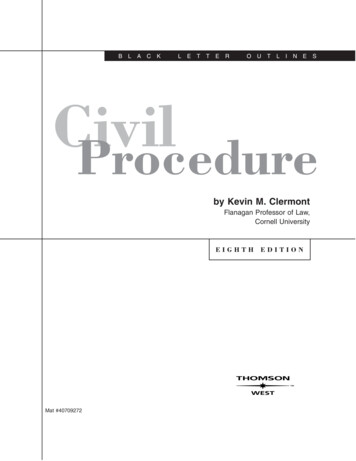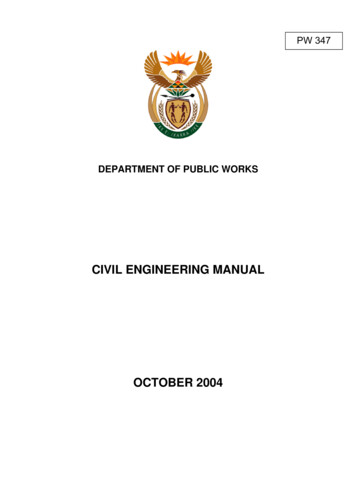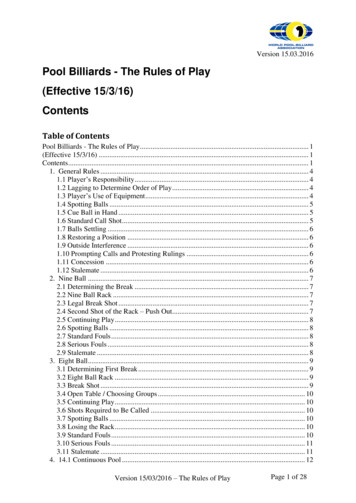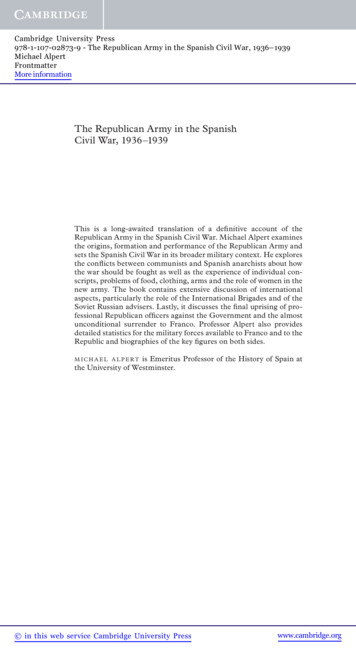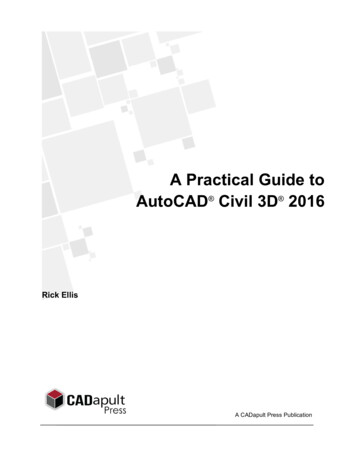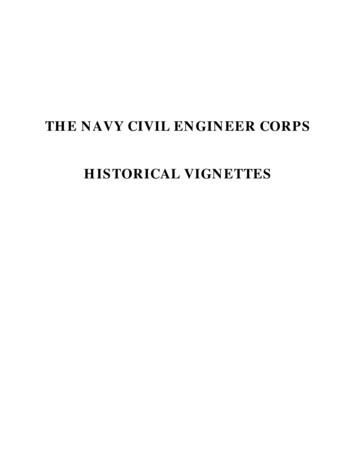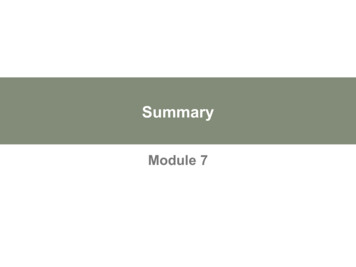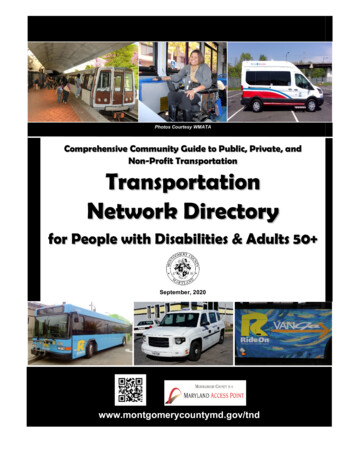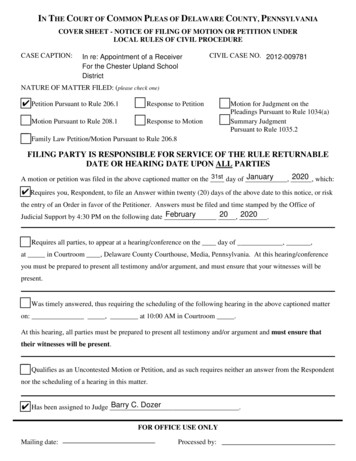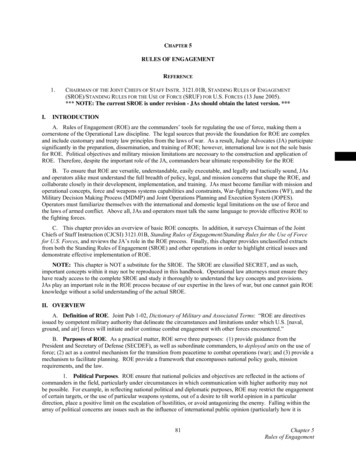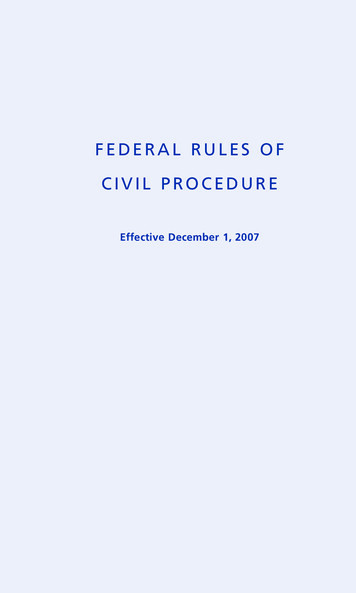
Transcription
FEDERAL RULES OFCIVIL PROCEDUREEffective December 1, 2007
FEDERAL RULES OF CIVIL PROCEDUREWest is pleased to provide you with the revised FederalRules of Civil Procedure, which became effective onDecember 1, 2007. This booklet replaces the FederalRules of Civil Procedure booklet published in July 2007.You can also access the revised Federal Rules of CivilProcedure on Westlaw by completing the following steps:1. At the tabbed Law School page, access the FederalRules database (US-RULES) by typing us-rules in theSearch these databases text box in the left frame.2. At the database Search page, type ci(frcp) in the Searchtext box.3. At the displayed result list, click the title of a rule toview its full text.When you know the citation of the rule you want toretrieve, use the Find service. For example, to retrieve Fed.R. Civ. P. 26, type frcp 26 in the Find by citation text boxin the left frame of the tabbed Law School page.
1FEDERAL RULES OF CIVILPROCEDURERule 1. Scope and PurposeThese rules govern the procedure in all civil actions andproceedings in the United States district courts, except asstated in Rule 81. They should be construed andadministered to secure the just, speedy, and inexpensivedetermination of every action and proceeding.Rule 3. Commencing an ActionA civil action is commenced by filing a complaint with thecourt.Rule 4. Summons(a) Contents; Amendments.(1) Contents. A summons must:(A) name the court and the parties;(B) be directed to the defendant;(C) state the name and address of the plaintiff's attorneyor—if unrepresented—of the plaintiff;(D) state the time within which the defendant must appearand defend;(E) notify the defendant that a failure to appear anddefend will result in a default judgment against thedefendant for the relief demanded in the complaint;(F) be signed by the clerk; and(G) bear the court's seal.Classroom Resources Rule 2. One Form of ActionThere is one form of action—the civil action.FEDERAL RULES OF CIVIL PROCEDUREFEDERAL RULES OF CIVIL PROCEDURE
2FEDERAL RULES OF CIVIL PROCEDURE(2) Amendments. The court may permit a summons to beamended.(b) Issuance. On or after filing the complaint, the plaintiffmay present a summons to the clerk for signature and seal.If the summons is properly completed, the clerk mustsign, seal, and issue it to the plaintiff for service on thedefendant. A summons—or a copy of a summons that isaddressed to multiple defendants—must be issued for eachdefendant to be served.(c) Service.(1) In General. A summons must be served with a copy ofthe complaint. The plaintiff is responsible for having thesummons and complaint served within the time allowedby Rule 4(m) and must furnish the necessary copies to theperson who makes service.(2) By Whom. Any person who is at least 18 years old andnot a party may serve a summons and complaint.(3) By a Marshal or Someone Specially Appointed. At theplaintiff's request, the court may order that service bemade by a United States marshal or deputy marshal or bya person specially appointed by the court. The court mustso order if the plaintiff is authorized to proceed in formapauperis under 28 U.S.C. § 1915 or as a seaman under28 U.S.C. § 1916.(d) Waiving Service.(1) Requesting a Waiver. An individual, corporation, orassociation that is subject to service under Rule 4(e), (f), or(h) has a duty to avoid unnecessary expenses of serving thesummons. The plaintiff may notify such a defendant thatan action has been commenced and request that the
defendant waive service of a summons. The notice andrequest must:(A) be in writing and be addressed:(i) to the individual defendant; or(ii) for a defendant subject to service under Rule 4(h), toan officer, a managing or general agent, or any other agentauthorized by appointment or by law to receive service ofprocess;(B) name the court where the complaint was filed;(C) be accompanied by a copy of the complaint, twocopies of a waiver form, and a prepaid means forreturning the form;(D) inform the defendant, using text prescribed in Form 5,of the consequences of waiving and not waiving service;(E) state the date when the request is sent;(F) give the defendant a reasonable time of at least 30 daysafter the request was sent—or at least 60 days if sent tothe defendant outside any judicial district of the UnitedStates—to return the waiver; and(G) be sent by first-class mail or other reliable means.(2) Failure to Waive. If a defendant located within theUnited States fails, without good cause, to sign and returna waiver requested by a plaintiff located within the UnitedStates, the court must impose on the defendant:(A) the expenses later incurred in making service; and(B) the reasonable expenses, including attorney's fees, ofany motion required to collect those service expenses.(3) Time to Answer After a Waiver. A defendant who,before being served with process, timely returns a waiverneed not serve an answer to the complaint until 60 daysFEDERAL RULES OF CIVIL PROCEDURE3Classroom ResourcesFEDERAL RULES OF CIVIL PROCEDURE
4FEDERAL RULES OF CIVIL PROCEDUREafter the request was sent—or until 90 days after it wassent to the defendant outside any judicial district of theUnited States.(4) Results of Filing a Waiver. When the plaintiff files awaiver, proof of service is not required and these rulesapply as if a summons and complaint had been served atthe time of filing the waiver.(5) Jurisdiction and Venue Not Waived. Waiving serviceof a summons does not waive any objection to personaljurisdiction or to venue.(e) Serving an Individual Within a Judicial District of theUnited States. Unless federal law provides otherwise, anindividual—other than a minor, an incompetent person, ora person whose waiver has been filed—may be served in ajudicial district of the United States by:(1) following state law for serving a summons in an actionbrought in courts of general jurisdiction in the state wherethe district court is located or where service is made; or(2) doing any of the following:(A) delivering a copy of the summons and of thecomplaint to the individual personally;(B) leaving a copy of each at the individual's dwelling orusual place of abode with someone of suitable age anddiscretion who resides there; or(C) delivering a copy of each to an agent authorized byappointment or by law to receive service of process.(f) Serving an Individual in a Foreign Country. Unlessfederal law provides otherwise, an individual—other thana minor, an incompetent person, or a person whose waiver
has been filed—may be served at a place not within anyjudicial district of the United States:(1) by any internationally agreed means of service thatis reasonably calculated to give notice, such as thoseauthorized by the Hague Convention on the ServiceAbroad of Judicial and Extrajudicial Documents;(2) if there is no internationally agreed means, or ifan international agreement allows but does not specifyother means, by a method that is reasonably calculatedto give notice:(A) as prescribed by the foreign country's law for servicein that country in an action in its courts of generaljurisdiction;(B) as the foreign authority directs in response to a letterrogatory or letter of request; or(C) unless prohibited by the foreign country’s law, by:(i) delivering a copy of the summons and of the complaintto the individual personally; or(ii) using any form of mail that the clerk addresses andsends to the individual and that requires a signed receipt;or(3) by other means not prohibited by internationalagreement, as the court orders.(g) Serving a Minor or an Incompetent Person. A minor oran incompetent person in a judicial district of the UnitedStates must be served by following state law for serving asummons or like process on such a defendant in an actionbrought in the courts of general jurisdiction of the statewhere service is made. A minor or an incompetent personFEDERAL RULES OF CIVIL PROCEDURE5Classroom ResourcesFEDERAL RULES OF CIVIL PROCEDURE
6FEDERAL RULES OF CIVIL PROCEDUREwho is not within any judicial district of the United Statesmust be served in the manner prescribed by Rule4(f)(2)(A), (f)(2)(B), or (f)(3).(h) Serving a Corporation, Partnership, or Association.Unless federal law provides otherwise or the defendant’swaiver has been filed, a domestic or foreign corporation,or a partnership or other unincorporated association thatis subject to suit under a common name, must be served:(1) in a judicial district of the United States:(A) in the manner prescribed by Rule 4(e)(1) for serving anindividual; or(B) by delivering a copy of the summons and of thecomplaint to an officer, a managing or general agent, orany other agent authorized by appointment or by law toreceive service of process and—if the agent is oneauthorized by statute and the statute so requires—by alsomailing a copy of each to the defendant; or(2) at a place not within any judicial district of the UnitedStates, in any manner prescribed by Rule 4(f) for servingan individual, except personal delivery under (f)(2)(C)(i).(i) Serving the United States and Its Agencies,Corporations, Officers, or Employees.(1) United States. To serve the United States, a party must:(A)(i) deliver a copy of the summons and of the complaintto the United States attorney for the district where theaction is brought—or to an assistant United Statesattorney or clerical employee whom the United Statesattorney designates in a writing filed with the courtclerk—or
(ii) send a copy of each by registered or certified mail tothe civil-process clerk at the United States attorney’s office;(B) send a copy of each by registered or certified mail tothe Attorney General of the United States at Washington,D.C.; and(C) if the action challenges an order of a nonparty agencyor officer of the United States, send a copy of each byregistered or certified mail to the agency or officer.(2) Agency; Corporation; Officer or Employee Sued in anOfficial Capacity. To serve a United States agency orcorporation, or a United States officer or employee suedonly in an official capacity, a party must serve the UnitedStates and also send a copy of the summons and of thecomplaint by registered or certified mail to the agency,corporation, officer, or employee.(3) Officer or Employee Sued Individually. To serve aUnited States officer or employee sued in an individualcapacity for an act or omission occurring in connectionwith duties performed on the United States’ behalf(whether or not the officer or employee is also sued inan official capacity), a party must serve the United Statesand also serve the officer or employee under Rule 4(e),(f), or (g).(4) Extending Time. The court must allow a party areasonable time to cure its failure to:(A) serve a person required to be served under Rule 4(i)(2),if the party has served either the United States attorney orthe Attorney General of the United States; or(B) serve the United States under Rule 4(i)(3), if the partyhas served the United States officer or employee.FEDERAL RULES OF CIVIL PROCEDURE7Classroom ResourcesFEDERAL RULES OF CIVIL PROCEDURE
8FEDERAL RULES OF CIVIL PROCEDURE(j) Serving a Foreign, State, or Local Government.(1) Foreign State. A foreign state or its politicalsubdivision, agency, or instrumentality must be served inaccordance with 28 U.S.C. § 1608.(2) State or Local Government. A state, a municipalcorporation, or any other state-created governmentalorganization that is subject to suit must be served by:(A) delivering a copy of the summons and of thecomplaint to its chief executive officer; or(B) serving a copy of each in the manner prescribed bythat state’s law for serving a summons or like process onsuch a defendant.(k) Territorial Limits of Effective Service.(1) In General. Serving a summons or filing a waiver ofservice establishes personal jurisdiction over a defendant:(A) who is subject to the jurisdiction of a court of generaljurisdiction in the state where the district court is located;(B) who is a party joined under Rule 14 or 19 and isserved within a judicial district of the United States andnot more than 100 miles from where the summons wasissued; or(C) when authorized by a federal statute.(2) Federal Claim Outside State-Court Jurisdiction. For aclaim that arises under federal law, serving a summons orfiling a waiver of service establishes personal jurisdictionover a defendant if:(A) the defendant is not subject to jurisdiction in anystate’s courts of general jurisdiction; and(B) exercising jurisdiction is consistent with the UnitedStates Constitution and laws.
(l) Proving Service.(1) Affidavit Required. Unless service is waived, proof ofservice must be made to the court. Except for service by aUnited States marshal or deputy marshal, proof must beby the server’s affidavit.(2) Service Outside the United States. Service not withinany judicial district of the United States must be proved asfollows:(A) if made under Rule 4(f)(1), as provided in theapplicable treaty or convention; or(B) if made under Rule 4(f)(2) or (f)(3), by a receipt signedby the addressee, or by other evidence satisfying the courtthat the summons and complaint were delivered to theaddressee.(3) Validity of Service; Amending Proof. Failure to proveservice does not affect the validity of service. The courtmay permit proof of service to be amended.(m) Time Limit for Service. If a defendant is not servedwithin 120 days after the complaint is filed, the court—onmotion or on its own after notice to the plaintiff—mustdismiss the action without prejudice against that defendantor order that service be made within a specified time. Butif the plaintiff shows good cause for the failure, the courtmust extend the time for service for an appropriate period.This subdivision (m) does not apply to service in a foreigncountry under Rule 4(f) or 4(j)(1).(n) Asserting Jurisdiction over Property or Assets.(1) Federal Law. The court may assert jurisdiction overproperty if authorized by a federal statute. Notice toFEDERAL RULES OF CIVIL PROCEDURE9Classroom ResourcesFEDERAL RULES OF CIVIL PROCEDURE
10FEDERAL RULES OF CIVIL PROCEDUREclaimants of the property must be given as provided in thestatute or by serving a summons under this rule.(2) State Law. On a showing that personal jurisdictionover a defendant cannot be obtained in the district wherethe action is brought by reasonable efforts to serve asummons under this rule, the court may assert jurisdictionover the defendant’s assets found in the district.Jurisdiction is acquired by seizing the assets under thecircumstances and in the manner provided by state lawin that district.Rule 4.1 Serving Other Process(a) In General. Process—other than a summons underRule 4 or a subpoena under Rule 45—must be served bya United States marshal or deputy marshal or by a personspecially appointed for that purpose. It may be servedanywhere within the territorial limits of the state wherethe district court is located and, if authorized by a federalstatute, beyond those limits. Proof of service must be madeunder Rule 4(l).(b) Enforcing Orders: Committing for Civil Contempt. Anorder committing a person for civil contempt of a decreeor injunction issued to enforce federal law may be servedand enforced in any district. Any other order in a civilcontempt proceeding may be served only in the statewhere the issuing court is located or elsewhere in theUnited States within 100 miles from where the orderwas issued.
Rule 5. Serving and Filing Pleadings andOther Papers(a) Service: When Required.(1) In General. Unless these rules provide otherwise, eachof the following papers must be served on every party:(A) an order stating that service is required;(B) a pleading filed after the original complaint, unless thecourt orders otherwise under Rule 5(c) because there arenumerous defendants;(C) a discovery paper required to be served on a party,unless the court orders otherwise;(D) a written motion, except one that may be heard exparte; and(E) a written notice, appearance, demand, or offer ofjudgment, or any similar paper.(2) If a Party Fails to Appear. No service is required on aparty who is in default for failing to appear. But a pleadingthat asserts a new claim for relief against such a partymust be served on that party under Rule 4.(3) Seizing Property. If an action is begun by seizingproperty and no person is or need be named as adefendant, any service required before the filing of anappearance, answer, or claim must be made on the personwho had custody or possession of the property when itwas seized.(b) Service: How Made.(1) Serving an Attorney. If a party is represented by anattorney, service under this rule must be made on theattorney unless the court orders service on the party.(2) Service in General. A paper is served under this rule by:FEDERAL RULES OF CIVIL PROCEDURE11Classroom ResourcesFEDERAL RULES OF CIVIL PROCEDURE
12FEDERAL RULES OF CIVIL PROCEDURE(A) handing it to the person;(B) leaving it:(i) at the person’s office with a clerk or other person incharge or, if no one is in charge, in a conspicuous place inthe office; or(ii) if the person has no office or the office is closed, at theperson’s dwelling or usual place of abode with someone ofsuitable age and discretion who resides there;(C) mailing it to the person’s last known address—inwhich event service is complete upon mailing;(D) leaving it with the court clerk if the person has noknown address;(E) sending it by electronic means if the person consentedin writing—in which event service is complete upontransmission, but is not effective if the serving party learnsthat it did not reach the person to be served; or(F) delivering it by any other means that the personconsented to in writing—in which event service iscomplete when the person making service delivers it to theagency designated to make delivery.(3) Using Court Facilities. If a local rule so authorizes, aparty may use the court’s transmission facilities to makeservice under Rule 5(b)(2)(E).(c) Serving Numerous Defendants.(1) In General. If an action involves an unusually largenumber of defendants, the court may, on motion or on itsown, order that:(A) defendants’ pleadings and replies to them need not beserved on other defendants;
(B) any crossclaim, counterclaim, avoidance, or affirmativedefense in those pleadings and replies to them will betreated as denied or avoided by all other parties; and(C) filing any such pleading and serving it on the plaintiffconstitutes notice of the pleading to all parties.(2) Notifying Parties. A copy of every such order must beserved on the parties as the court directs.(d) Filing.(1) Required Filings; Certificate of Service. Any paper afterthe complaint that is required to be served—together witha certificate of service—must be filed within a reasonabletime after service. But disclosures under Rule 26(a)(1) or(2) and the following discovery requests and responsesmust not be filed until they are used in the proceeding orthe court orders filing: depositions, interrogatories,requests for documents or tangible things or to permitentry onto land, and requests for admission.(2) How Filing Is Made—In General. A paper is filed bydelivering it:(A) to the clerk; or(B) to a judge who agrees to accept it for filing, and whomust then note the filing date on the paper and promptlysend it to the clerk.(3) Electronic Filing, Signing, or Verification. A court may,by local rule, allow papers to be filed, signed, or verifiedby electronic means that are consistent with any technicalstandards established by the Judicial Conference of theUnited States. A local rule may require electronic filingonly if reasonable exceptions are allowed. A paper filedFEDERAL RULES OF CIVIL PROCEDURE13Classroom ResourcesFEDERAL RULES OF CIVIL PROCEDURE
14FEDERAL RULES OF CIVIL PROCEDUREelectronically in compliance with a local rule is a writtenpaper for purposes of these rules.(4) Acceptance by the Clerk. The clerk must not refuse tofile a paper solely because it is not in the form prescribedby these rules or by a local rule or practice.Rule 5.1 Constitutional Challenge to a Statute—Notice, Certification, and Intervention(a) Notice by a Party. A party that files a pleading,written motion, or other paper drawing into questionthe constitutionality of a federal or state statute mustpromptly:(1) file a notice of constitutional question stating thequestion and identifying the paper that raises it, if:(A) a federal statute is questioned and the parties donot include the United States, one of its agencies, orone of its officers or employees in an official capacity; or(B) a state statute is questioned and the parties do notinclude the state, one of its agencies, or one of its officersor employees in an official capacity; and(2) serve the notice and paper on the Attorney General ofthe United States if a federal statute is questioned—or onthe state attorney general if a state statute is questioned—either by certified or registered mail or by sending it to anelectronic address designated by the attorney general forthis purpose.(b) Certification by the Court. The court must, under 28U.S.C. § 2403, certify to the appropriate attorney generalthat a statute has been questioned.
Rule 5.2 Privacy Protection for Filings Made withthe Court(a) Redacted Filings. Unless the court orders otherwise,in an electronic or paper filing with the court thatcontains an individual’s social-security number,taxpayer-identification number, or birth date, the nameof an individual known to be a minor, or a financialaccount number, a party or nonparty making the filingmay include only:(1) the last four digits of the social-security numberand taxpayer-identification number;(2) the year of the individual’s birth;(3) the minor’s initials; and(4) the last four digits of the financial-account number.(b) Exemptions from the Redaction Requirement. Theredaction requirement does not apply to the following: (c) Intervention; Final Decision on the Merits. Unlessthe court sets a later time, the attorney general mayintervene within 60 days after the notice is filed orafter the court certifies the challenge, whichever isearlier. Before the time to intervene expires, the courtmay reject the constitutional challenge, but may notenter a final judgment holding the statuteunconstitutional.(d) No Forfeiture. A party’s failure to file and serve thenotice, or the court’s failure to certify, does not forfeita constitutional claim or defense that is otherwisetimely asserted.FEDERAL RULES OF CIVIL PROCEDURE15Classroom ResourcesFEDERAL RULES OF CIVIL PROCEDURE
16FEDERAL RULES OF CIVIL PROCEDURE(1) a financial-account number that identifies the propertyallegedly subject to forfeiture in a forfeiture proceeding;(2) the record of an administrative or agency proceeding;(3) the official record of a state-court proceeding;(4) the record of a court or tribunal, if that record was notsubject to the redaction requirement when originally filed;(5) a filing covered by Rule 5.2(c) or (d); and(6) a pro se filing in an action brought under 28 U.S.C. §§2241, 2254, or 2255.(c) Limitations on Remote Access to Electronic Files;Social-Security Appeals and Immigration Cases. Unless thecourt orders otherwise, in an action for benefits under theSocial Security Act, and in an action or proceeding relatingto an order of removal, to relief from removal, or toimmigration benefits or detention, access to an electronicfile is authorized as follows:(1) the parties and their attorneys may have remoteelectronic access to any part of the case file, including theadministrative record;(2) any other person may have electronic access to the fullrecord at the courthouse, but may have remote electronicaccess only to:(A) the docket maintained by the court; and(B) an opinion, order, judgment, or other disposition of thecourt, but not any other part of the case file or theadministrative record.(d) Filings Made Under Seal. The court may order that afiling be made under seal without redaction. The courtmay later unseal the filing or order the person who madethe filing to file a redacted version for the public record.
Rule 6. Computing and Extending Time; Time forMotion Papers(a) Computing Time. The following rules apply incomputing any time period specified in these rules or inany local rule, court order, or statute:(1) Day of the Event Excluded. Exclude the day of the act,event, or default that begins the period. (e) Protective Orders. For good cause, the court may byorder in a case:(1) require redaction of additional information; or(2) limit or prohibit a nonparty’s remote electronic accessto a document filed with the court.(f) Option for Additional Unredacted Filing Under Seal.A person making a redacted filing may also file anunredacted copy under seal. The court must retain theunredacted copy as part of the record.(g) Option for Filing a Reference List. A filing thatcontains redacted information may be filed togetherwith a reference list that identifies each item of redactedinformation and specifies an appropriate identifier thatuniquely corresponds to each item listed. The list must befiled under seal and may be amended as of right. Anyreference in the case to a listed identifier will be construedto refer to the corresponding item of information.(h) Waiver of Protection of Identifiers. A person waivesthe protection of Rule 5.2(a) as to the person’s owninformation by filing it without redaction and notunder seal.FEDERAL RULES OF CIVIL PROCEDURE17Classroom ResourcesFEDERAL RULES OF CIVIL PROCEDURE
18FEDERAL RULES OF CIVIL PROCEDURE(2) Exclusions from Brief Periods. Exclude intermediateSaturdays, Sundays, and legal holidays when the period isless than 11 days.(3) Last Day. Include the last day of the period unless it isa Saturday, Sunday, legal holiday, or—if the act to be doneis filing a paper in court—a day on which weather orother conditions make the clerk’s office inaccessible. Whenthe last day is excluded, the period runs until the end ofthe next day that is not a Saturday, Sunday, legal holiday,or day when the clerk’s office is inaccessible.(4) “Legal Holiday” Defined. As used in these rules, “legalholiday” means:(A) the day set aside by statute for observing New Year’sDay, Martin Luther King Jr.’s Birthday, Washington’sBirthday, Memorial Day, Independence Day, Labor Day,Columbus Day, Veterans’ Day, Thanksgiving Day, orChristmas Day; and(B) any other day declared a holiday by the President,Congress, or the state where the district court is located.(b) Extending Time.(1) In General. When an act may or must be done within aspecified time, the court may, for good cause, extend thetime:(A) with or without motion or notice if the court acts, or ifa request is made, before the original time or its extensionexpires; or(B) on motion made after the time has expired if the partyfailed to act because of excusable neglect.
Rule 7. Pleadings Allowed; Form of Motions andOther Papers(a) Pleadings. Only these pleadings are allowed:(1) a complaint;(2) an answer to a complaint;(3) an answer to a counterclaim designated as acounterclaim;(4) an answer to a crossclaim; (2) Exceptions. A court must not extend the time to actunder Rules 50(b) and (d), 52(b), 59(b), (d), and (e), and60(b), except as those rules allow.(c) Motions, Notices of Hearing, and Affidavits.(1) In General. A written motion and notice of the hearingmust be served at least 5 days before the time specified forthe hearing, with the following exceptions:(A) when the motion may be heard ex parte;(B) when these rules set a different time; or(C) when a court order—which a party may, for goodcause, apply for ex parte—sets a different time.(2) Supporting Affidavit. Any affidavit supporting amotion must be served with the motion. Except as Rule59(c) provides otherwise, any opposing affidavit must beserved at least 1 day before the hearing, unless the courtpermits service at another time.(d) Additional Time After Certain Kinds of Service. Whena party may or must act within a specified time afterservice and service is made under Rule 5(b)(2)(C), (D), (E),or (F), 3 days are added after the period would otherwiseexpire under Rule 6(a).FEDERAL RULES OF CIVIL PROCEDURE19Classroom ResourcesFEDERAL RULES OF CIVIL PROCEDURE
20FEDERAL RULES OF CIVIL PROCEDURE(5) a third-party complaint;(6) an answer to a third-party complaint; and(7) if the court orders one, a reply to an answer.(b) Motions and Other Papers.(1) In General. A request for a court order must be madeby motion. The motion must:(A) be in writing unless made during a hearing or trial;(B) state with particularity the grounds for seeking theorder; and(C) state the relief sought.(2) Form. The rules governing captions and other mattersof form in pleadings apply to motions and other papers.Rule 7.1. Disclosure Statement(a) Who Must File; Contents. A nongovernmentalcorporate party must file two copies of a disclosurestatement that:(1) identifies any parent corporation and any publicly heldcorporation owning 10% or more of its stock; or(2) states that there is no such corporation.(b) Time to File; Supplemental Filing. A party must:(1) file the disclosure statement with its first appearance,pleading, petition, motion, response, or other requestaddressed to the court; and(2) promptly file a supplemental statement if any requiredinformation changes.Rule 8. General Rules of Pleading(a) Claim for Relief. A pleading that states a claim forrelief must contain:
(1) a short and plain statement of the grounds for thecourt’s jurisdiction, unless the court already hasjurisdiction and the claim needs no new jurisdictionalsupport;(2) a short and plain statement of the claim showing thatthe pleader is entitled to relief; and(3) a demand for the relief sought, which may includerelief in the alternative or different types of relief.(b) Defenses; Admissions and Denials.(1) In General. In responding to a pleading, a party must:(A) state in short an
sign, seal, and issue it to the plaintiff for service on the defendant. A summons—or a copy of a summons that is addressed to multiple defendants—must be issued for each defendant to be served. (c) Service. (1) In General. A summons must be served with a copy of t
